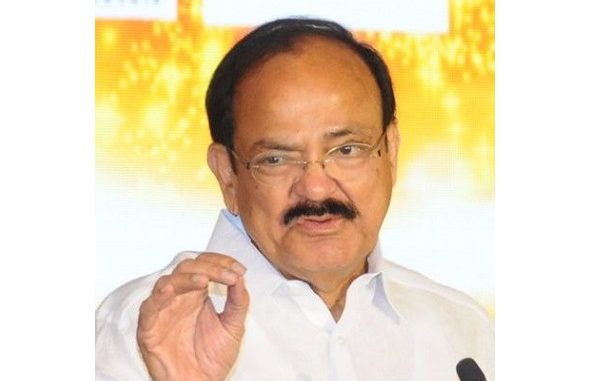
May 14:The Vice President, Shri M. Venkaiah Naidu today called for enhancing the quality and capacity of agricultural research in the country to achieve substantial gains in agri-productivity in the long term. Noting that no advanced country can improve Agri productivity without extension activities, Shri Naidu suggested increasing the R&D expenditure – which is ‘less than one percent of our agricultural GDP’, he said.
Further, Shri Naidu called for ‘every effort by the agricultural researchers, policymakers, entrepreneurs, and scientists to make agriculture climate-resilient, profitable and sustainable for farmers and to ensure nutritional security.
The Vice President was attending the Graduation ceremony of the Agri-Business Management program of ICAR – National Academy of Agricultural Research Management (NAARM) in Hyderabad today. Shri Naidu also presented a few select students with Gold medals and Director’s medals. NAARM is a specialized institution of the Indian Council of Agricultural Research (ICAR), established to build capacity in agricultural research, education, and extension education systems.
Speaking on the occasion, Shri Naidu emphasized that agricultural universities must consider it their bounden duty to not only develop new techniques and methods of sustainable production but also to take these developments to the last farmer in every part of the country. He called upon agricultural universities to encourage students to visit villages and know the actual farm issues firsthand. ‘We must imbibe the slogan ‘Lab to Land’ of Prime Minister Shri Narendra Modi to bring research benefits to farmers to enhance production and incomes’, he said.
Elaborating on this, Shri Naidu suggested that extension inputs to farmers should be broken down into ‘simple language, without resorting to too much technical jargon. He also suggested exploring mobile-based extension services and offering ‘one-stop solutions for all services, on-demand, and without any clutter.
The Vice President touched upon various emerging challenges of Indian agriculture such as reducing the availability of water, climate change, soil degradation, loss of biodiversity, new pests and diseases, and fragmentation of farms, among other issues, adding that this makes “the task of agricultural research even more critical in the coming years”
To tackle these challenges, Shri Naidu called for a “paradigm shift in our research approach” and aim for excellence in technological innovation, human resources, and extension services. He also suggested investing in critical areas such as genomics, molecular breeding, and nanotechnology, among other areas. He called upon ICAR institutions to bring out synergies between agriculture and modern technologies such as drones and Artificial Intelligence and develop scalable products.
Shri Naidu particularly stressed the importance of creating skilled manpower in secondary and tertiary agriculture to make it profitable. He observed that trained agri-business graduates can work towards making agriculture more an organized sector and become job providers instead of job seekers.
The Vice President observed that there is a pressing need to encourage farmers to take up allied activities to diversify the risk of crop failure. He also suggested the adoption of agro-climatically suitable crops such as millets and horticultural crops. Shri Naidu called for more investments in cold storage and other infrastructure which add more value to produce and give better farm gate prices for farmers.
On the occasion, the Vice President paid rich tributes to Indian farmers and said that “no matter what came their way, be it floods, droughts or even a pandemic, our farmers have always stood tall in the face of adversities”. He observed that despite several challenges, the Indian agriculture sector “never fails to surprise with its resilience”.
Dr. Ranjit Kumar, Head, ICAR-NAARM, Dr. T. Mohapatra, Secretary, DARE & DG, ICAR, Dr. Ch. Srinivasa Rao, Director, ICAR-NAARM, Dr. G. Venkateshwarlu, Dean & Jt. Director, ICAR-NAARM, B. Ganesh Kumar, Principal Coordinator, PGDM-ABM, and other dignitaries were present during the event.
Following is the full text of the speech:
“Sisters and brothers,
I am delighted to be a part of this convocation ceremony at ICAR – National Academy of Agricultural Research Management (NAARM) today. As a premier educational institution in agricultural research and management in the country, ICAR–NAARM has been making key contributions to Indian agriculture. It is indeed a pleasure to see young management professionals such as you, joining the efforts to make agriculture profitable for everyone.
Friends,
Agriculture is an area that is very close to my heart. Agriculture is not only of great historical and cultural significance to us but also provides a source of livelihood to more than 50% of the nation’s population. Importantly, it contributes in significant measure to our GDP.
Over the years, our agriculture sector has passed through various phases of evolution and multiple revolutions. In the process, it kept performing better. Starting from a state of food deficit due to the callousness and mismanagement of the British, we soon became food secure and even food surplus. Despite several challenges like rising population, changing lifestyles, growing urbanization, climate change, and most recently the COVID-19 pandemic, our agriculture sector never failed to surprise us with its resilience. No matter what came their way, be it floods, droughts, or even a pandemic, our farmers have always stood tall in the face of adversities.
Therefore, every effort needs to be made by the agricultural researchers, policymakers, entrepreneurs, and scientists to make agriculture climate-resilient, profitable, sustainable, and productive so that our farmers reap the fruits of their hard work and the food and nutritional requirements of millions are ensured. In this context, I am happy to note that the country’s exports of agricultural products have crossed $50 billion for the first time in the last fiscal year.
Sisters and brothers,
In these efforts to make agriculture more productive and profitable for farmers, I see the role of extension workers, researchers, agri-scientists, and agro-business professionals as indispensable.
No advanced country can improve Agri productivity in the long term without investing in research and extension. We have a wide network of National Agricultural Research System (NARS) in the country with several stakeholders and institutions for this purpose.
Going forward, we have to further equip and enhance the capacity of agricultural research in the country to achieve substantial gains in agri-productivity. To begin with, we need to increase our R&D expenditure on agriculture – standing at less than one percent of our agricultural GDP, which is less than what other developed and developing countries spend.
Agricultural universities must consider it their bounden duty to not only develop new techniques and methods of sustainable production but also to take these developments to the last farmer in every part of the country. We must imbibe the slogan ‘Lab to Land’ of Prime Minister Shri Narendra Modi to bring research benefits to farmers to enhance production and income. The real purpose of research, above all, is to bring a meaningful change in people’s lives.
The extension inputs to farmers should be broken down into simple language which they can understand, without resorting to too much technical jargon. Mobile-based extension services may also be explored to increase the reach among farmers who are not in proximity to an agricultural university. One-stop solutions for both hardware technology and information services must be offered to farmers, on-demand, and without any clutter.
One of the focus areas of ICAR institutions should be to bring out synergies between agriculture and modern technologies such as drones and Artificial Intelligence and develop scalable products. Technology can also solve the problem of bringing customized solutions at the farm level, taking the agro-ecological diversities into account. Technology can also keep farmers abreast of information in the market – price movements, demand and supply of goods, and weather-related advisories. e-NAM has been a successful implementation of this. We must further leverage India’s edge in the software and IT world to nurture more agri-based start-ups.
Sisters and brothers,
Indian agriculture is going through a great transition now. Reducing the availability of quality water, nutrient deficiency in soils, climate change, loss of biodiversity, the emergence of new pests and diseases, fragmentation of farms, and market uncertainties are some of the changes that will make the task of agricultural research even more critical in the coming years.
These changes impacting agriculture call for a paradigm shift in our research approach. We have to harness the potential of modern science, encourage innovations in technology, and provide enabling policies to support investments. We must also start investing seriously in critical areas such as genomics, molecular breeding, and nanotechnology, among other areas.
Our institutions of agricultural research must redouble their efforts and aim for excellence in technological innovation, human resources, and extension services to meet these challenges. Of these, the importance of creating skilled manpower in secondary and tertiary agriculture to make it profitable cannot be overstated. In turn, trained agri-business graduates can work towards making agriculture more into an organized sector and become job providers instead of job seekers.
Sisters and brothers,
Once again, I am very happy to have visited your campus and attended this graduation ceremony. I congratulate all the students who received their Certificates, the Gold Medalists, and their parents. I am sure you will contribute to building an Atmanirbhar India by reducing food losses, adding value to agri products, bringing market innovations, and ultimately, engendering wealth creation for the farmers and the country as a whole through agriculture.
My best wishes and regards to the ICAR fraternity as your resolve and efforts grow stronger each year to make Indian agriculture more sustainable, productive, and profitable with time.
Thank you. Namaskar.
Jai Hind!”
*****
Disclaimer: We donot claim that the images used as part of the news published are always owned by us. From time to time, we use images sourced as part of news or any related images or representations. Kindly take a look at our image usage policy on how we select the image that are used as part of the news.


